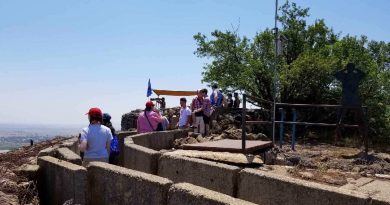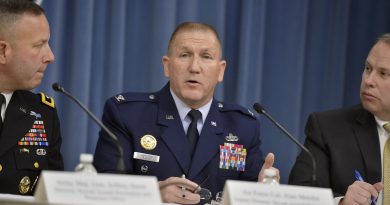To Experience the U.N., Students Come to Seton Hall
By Francesca Regalado
Managing Editor
“If you’ve already had breakfast, please start making your way to the bus,” Dr. Courtney Smith urged his flock of graduate students, undergraduates, and some professionals. It was the last day of the School’s United Nations Intensive Summer Program, and no one wanted to be late for the main event: a Security Council meeting on peacekeeping operations and the protection of civilians.

For a week, the group met for breakfast in the Diplomacy Room at 7 a.m., departed for New York City on a chartered bus at 8:00, and returned to South Orange for dinner at 6:45 p.m. Venues ranged from the United Nations headquarters to the Ford Foundation, and even to the United States Mission to the U.N. Activities included touring the United Nations headquarters, hearing from a senior staffer at the Executive Office of the Secretary General, and learning about the sustainable development goals.
Dr. Smith, senior associate dean of the School of Diplomacy, has taught nearly 700 participants and facilitated 17 sessions of the program since 2001 – one year it ran twice. The School, located less than an hour from New York City, attracts students and faculty by promoting its connections to the United Nations, with which countless students have secured internships and employment. The summer program drives that point home.
The program was developed with the School’s partners at the United Nations Association of the U.S.A. (UNA-USA), and set up as an “intensive summer program” so that students from other universities and mid-career professionals could also attend.
UNA-USA assists the School with selecting practitioners to speak, while others are identified through the research connections of the School’s faculty or recommendations from previous speakers.
“At first, the program involved fewer practitioner sessions to allow time for more background briefings and discussion at the U.N,” Dr. Smith said. But student evaluations persuaded him to have the briefings and discussion on the bus instead to expand the roster of practitioners.
“In the early years, participants met with a dozen or so speakers,” Dr. Smith said. “Now the typical amount is 20 or more.”
This year, the most highly rated speakers by the participants were Minh-Thu Pham, executive director for policy at the United Nations Foundation, and Warren Hoge, senior adviser for external relations at the International Peace Institute and former U.N. correspondent at the New York Times.

“Minh-Thu explained the U.N. system while cutting through the jargon,” said Phumla Ngqawa-Adesanya, a second-year graduate student at the School of Diplomacy.
While Ms. Pham gave participants an overview of the U.N., as well as insight into the search for a successor to Secretary General Ban Ki-moon, Mr. Hoge spoke about public perceptions of the U.N.
Sid Bagri, a senior at the School of Diplomacy, named Mr. Hoge as his favorite speaker because “he was more in touch with people’s thoughts” through years of reporting on the U.N. Ryan Cascardo, a graduate student also at the School of Diplomacy who received his bachelor’s degree from American University, added that Mr. Hoge, “tried to answer all the students’ questions and didn’t dodge anything.”

The participants were also impressed by Dr. Smith, who took charge of the morning background briefings on the bus. Jona Beliu of Albania, a junior studying politics at Oberlin College in Ohio, said of Dr. Smith, “He’s on top of his game.”
“Dr. Smith has very high energy,” said Hansel Enriquez, a first-year graduate student at Kennesaw State University in Atlanta, GA. He added that he enjoyed Dr. Smith’s storytelling style of lecturing.
The program attracts professionals and students from all over the United States, and even from other countries. Among the group’s professionals was Fr. Karl Lindblad, a chaplain for the Department of Veterans Affairs who studied national security at the U.S. Naval War College. Pavel Agababyan of Russia learned about the program when he met a former participant in Singapore. Yasmina Asrarguis of Morocco, a junior at the University of Bath in England with a keen interest in French politics, looked forward to observing the Security Council meeting because it was to be presided by Jean-Marc Ayrault, France’s minister of foreign affairs.
“Typically the program receives between 50 and 80 applications each year,” Dr. Smith said. The average size of the group is 40, and the largest had 62 participants.
The program is marketed through websites and mailing lists related to the United Nations and other international organizations that are targeted directly at students – such as Model U.N. participants – and professors.
Hana Faidi of McMaster University and Emilia Zibaei of Wilfred Laurier University, both in Ontario, Canada, learned about the program through the Academic Council of the United Nations System (ACUNS), where Ms. Zibaei was a research intern. Both of them had previously participated in similar programs at the U.N., but they found Seton Hall’s more intimate, focused, and specific.
“After every speaker, we thought, ‘That was the best one.’ But the next speaker would be even better,” Ms. Faidi said.
This year saw a higher proportion of Seton Hall students compared to the past few years, with an almost 50-50 split between SHU and outside students. Those who choose to take the program for credit are mostly from Seton Hall, including second-year graduate student Paola Ordonez and junior Teresa Gonzalez, and were required to submit a final paper.
Building on her interest in human trafficking and women’s rights, Ms. Gonzalez compared for her final paper two peacekeeping missions – one successful and the other, unsuccessful – that dealt with sexual abuse as a method of war.
Mr. Enriquez of Atlanta, GA, has a bachelor’s degree in sociology, with a focus on gender equality and secularism. His favorite speaker at the Seton Hall program was Dr. Gustavo Gonzalez Canali, senior adviser at U.N. Women. Although he had participated in a program organized by his university at the U.N. headquarters in Geneva, where they visited U.N. agencies and the International Committee of the Red Cross, Mr. Enriquez found the speakers at Seton Hall “higher-profile.”
“I got to politicize my interest a bit more,” he said about the session with Dr. Gonzalez.
Elizabeth Nunez, a senior at Colorado State University, said that she had heard little about the U.N. from her political science classes. During the program, she received her first lesson on the sustainable development goals, and she became more interested in environmental issues after hearing Genevieve Maricle, ECOSOC officer at the United States Mission to the U.N., and Jenna Slotin, director of the U.N. Foundation’s Post-2015 Initiative.
When asked about the ambivalence typically felt by political science majors toward international organizations, Ms. Nunez laughed and said, “The program changed my perception about the U.N.”
Marisela Rivera, a graduate student at the School of Diplomacy, said that what stood out to her during the program was how honest and open the speakers were about the flaws and expectations of the U.N.
“No one there is trying to sugarcoat anything. We know the U.N. has its issues,” Ms. Rivera said. “Regardless, I know that I want to work for it and what it stands for.”
Abby Shamray and Theodore Ezike contributed to this report.



RT @EnvoyAtSHU: To Experience the U.N., Students Come to Seton Hall’s Intensive Summer Program @shudiplomacy https://t.co/PUKpQnoJa6
RT @EnvoyAtSHU: To Experience the U.N., Students Come to Seton Hall’s Intensive Summer Program @shudiplomacy https://t.co/PUKpQnoJa6